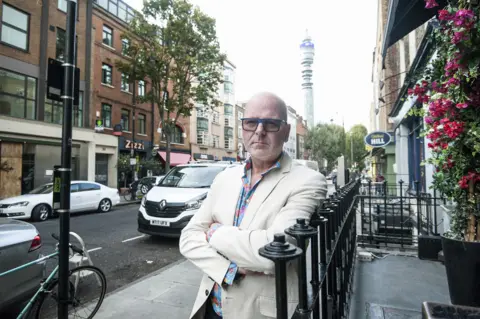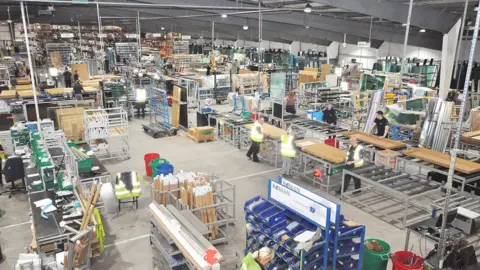Coronavirus: 'The only thing on my mind is coming back'
 David Moore
David Moore"The only thing on my mind is coming back and how we do it. And I have a lot of time to think," says restaurateur David Moore.
He has run the Michelin-starred Pied à Terre in central London for 28 years.
It took just days to close the restaurant's doors when the coronavirus lockdown was introduced.
Now, like many other businesses, Mr Moore wants clarity about what restrictions might be in place when his restaurant can start serving again.
Next week, the government will release a series of papers outlining how it intends to get the UK economy up and running again once the pandemic passes.
Research by business groups show that companies overwhelmingly want to get back to work as soon as possible and want information on how to do so.
For Mr Moore that means finding out things like: "Will there be a quota on the number of people I can let in per square foot? Will there be rules about distances between tables?"
Reopening will not be a quick process. His staff are on furlough, he'll have to reconnect with his suppliers and write a new pared-down menu that doesn't require too many chefs in the kitchen.
And there is concern about when customers might feel confident to eat out again.
Meanwhile, other businesses are facing their own challenges.
Socially-distanced haircuts
If social-distancing in a restaurant sounds difficult, in some industries it's nigh on impossible.
Hairdresser Robert Eaton is expecting a flood of customers desperate for post lockdown haircuts and beauty treatments when he reopens his Leeds salons.
 Robert Eaton
Robert EatonLike so many, he's thinking about how to do this safely. "We've ordered disposable gowns, disposable towels, hand sanitiser and we've been thinking about how we can isolate areas of the salons," he says.
"Most importantly we need to work on client confidence."
Removing the number of chairs in the salon will cut the number of customers, so he is planning to extend his opening hours to compensate.
Mr Eaton thinks they will be able to offer nail and waxing treatments safely, but not massages or facials.
He also expects customers will be opting for more natural and less high-maintenance looks, with few requests for colour, which will all have an effect on the salon's revenue.
Eye exams
Optometrists have similar concerns about how to work with their patients safely.
 Bhavin Shah
Bhavin ShahBhavin Shah of Central Vision Opticians is planning to do part of his consultations by phone and use new digital imaging equipment so examinations can be performed at distance.
The company is going to space out appointment times to give them opportunity to disinfect surfaces, equipment and spectacle frames that have been touched by customers.
Nonetheless he says "I believe it will take at least a year to start to become even close to some normality and another year to rebuild the thriving business that we used to have just one month ago."
He is also worried about when - and if - customers will decide to come back.
"So far, if we can keep at least half of our normal customers coming through, we'll be able to manage our cash flow. If there is a second wave of infections in the country and a new lockdown, I'll have to hope that another round of government grants would carry us through."
Offices open last
Tamzen Isacsson, chief Executive of the Management Consultancies Association, has been working with the Department for Business, Innovation and Skills on getting offices back to work after the lockdown.
 The Management Consultancies Association
The Management Consultancies AssociationShe says that office-based companies will the last to open their doors, particularly in places where hot-desking is used.
She argues that home working will become more commonplace and in some cases will cause major shifts for firms. Social distancing will mean that companies will lose large amounts of office space, as much as two thirds, and they will have to think differently about where their staff work.
But many firms are reporting problems with the mental health of their teams caused by self-isolation.
Ms Isacsson says: "We shouldn't underestimate staff not wanting to go back to office and those who are very fearful about returning to work.
"It needs to be carefully managed as people should not be put under pressure."
Not quite business as usual
Some companies not on the lockdown list are already starting to go back to work.
 Roman Showers
Roman ShowersShower manufacturer Roman stopped work at the start of April as all of its customers closed.
It is now bringing in a quarter of its staff this week, to fulfil demand as the house builders also reopen their sites and need showers in their supply chains.
Managing director David Osborne says he's expecting a busy few weeks ahead, then a lull until October.
Their high speed assembly lines makes social distancing on the factory floor straightforward, what's more complicated is how their sales force interact with customers.
